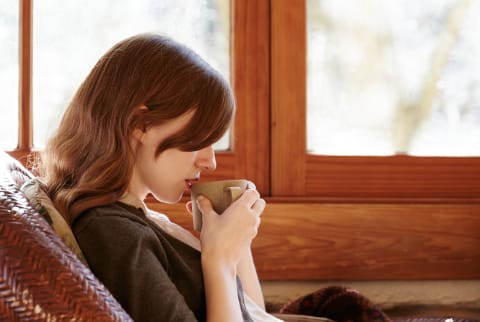Not even 100 degree weather or a dangerously bumpy subway ride will stop me from sipping on a scalding cup of coffee. So, when a coworker of mine speculated that coffee might worsen period cramps, I was a bit dismissive of the idea. It’s not that I didn’t believe her, it’s just that I didn’t want to believe her. So, I turned to the experts for a second opinion. Here’s what OB/GYNs have to say about consuming caffeine during your menstrual phase:
Should you drink coffee on your period?
It’s important to note: It’s not the coffee itself that raises questions here—it’s the caffeine. So, while decaf drinkers can proceed as normal, the answer isn’t quite as clear cut for caffeine fiends.
If you look to guidelines from the American College of Obstetricians and Gynecologists, avoiding caffeine is recommended to help relieve PMS symptoms. Whereas, one 2016 study published in the American Journal of Clinical Nutrition found that caffeine intake was not even associated with PMS symptoms.
At the end of the day, it appears the answer to this question differs based on who you ask, and how your individual body reacts to the substance.
How might caffeine affect cramps?
The research on caffeine and cramping is pretty limited, but here’s what a few different gynecologists theorize about the association.
Based on a 2012 study, board-certified OB/GYN Anna Cabeca, D.O. says “drinking caffeine-filled drinks, like tea and coffee, might increase your estrogen levels, which can make PMS symptoms worse. That being said, it is very individual, from person-to-person and from month-to-month.” To further support that point, this particular study showed an increase in estrogen levels from moderate caffeine intake for Asian women, but a decrease for white women.
“Caffeine also causes vasoconstriction, which is a fancy way of saying that caffeine narrows the blood vessels,” OB/GYN Wendie Trubow, M.D., tells mbg.
During menstruation, the uterus is shedding its lining and will contract to release the menses. When blood flow is limited to the uterus, Cabeca says it may increase tension and eventually the intensity of pain during this process.
Again, there are very few studies to back this up. “It’s all theory, no fact,” Trubow emphasizes. If you are noticing a correlation between coffee consumption and your period cramps, consider swapping for a more soothing beverage.
“Caffeine-free herbal teas (or green tea as long as it’s decaf) are high on my list of recommended drinks,” Cabeca says. “The herbs and the heat combined can be very soothing.”
Unfortunately, the research on caffeine and PMS symptoms is limited, and what does exist has mixed results. For now, staying attuned with your own body is the best way to find out how coffee might affect you during your period.
“In the control group of one, you really have to experiment on your own and see how it impacts you,” Cabeca says. Excuse me while I pour myself another cup…








